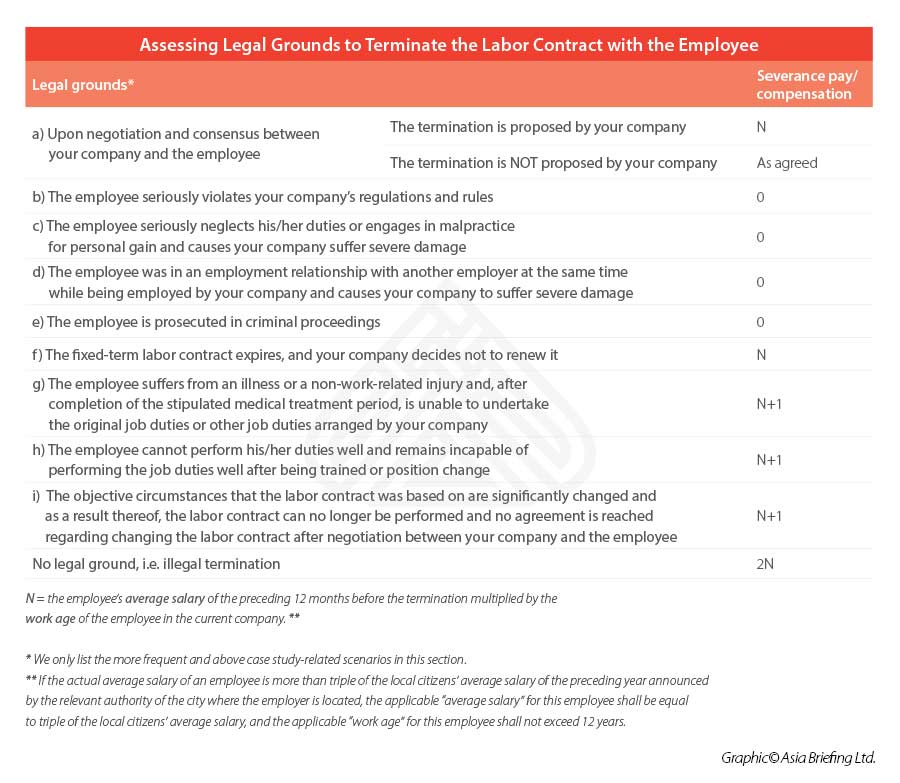Dismissing an Employee in a Senior Role: Some Insights Based on Case Studies
By Donfil Huang, Dezan Shira & Associates’ Guangzhou Office
In this article, we look at two case studies and address some commonly asked questions regarding the dismissal of an employee holding a senior position or important role in the company.
The focus is on addressing questions about the company’s intention and the legal basis of such a dismissal.
Case 1
An Italian company (“Company A”) operates a small office in China with around five employees (“Chinese Office”), having a Chinese general manager (“Employee B”) who plays a supervisory management role at the Chinese Office and whose tasks include securing proper suppliers, selling products to overseas clients, office administration etc.
Employee B has been working at the Chinese Office for more than five years. Considering multiple factors, including the possibility that the Chinese Office may have been manipulated by Employee B for a long time – either doing something illegal without company knowledge or pursuing personal profit at the company’s expense or in a way that is harmful to the Chinese Office – Company A was determined to dismiss Employee B.
Before dismissing Employee B, the representative from Company A conducted an investigation on the operation of the Chinese Office and was shocked to find that Employee B had indeed been indulging in fraudulent behavior since the beginning of his employment.
Employee B had established another company with the biggest supplier of Company A, and in the course of his employment as a general manager at the Chinese Office of Company A – Employee B had obtained numerous benefits in all the transactions between Company A and its top supplier.
Company A collected and preserved the relevant evidence and negotiated the termination of the labor contract with Employee B, with such evidence as bargaining power.
After several rounds of negotiation, Employee B was persuaded to resign, and sign an agreement in writing not to extract improper benefits from Company A. As a negotiated result, Company A also paid Employee B “severance pay” to end the employment relationship in an amicable manner, the amount of which was reasonable and lower than what Company A had expected.
Case 2
An Australian-invested company (“Company C”) runs a small factory and produces leather products in China, having no more than 20 employees in total. An employee (“Employee D”) was the head of the department in charge of the production of Company C. Employee D did not get along with the general manager of Company C.
For instance, Employee D never listened to the general manager’s instructions, verbally fought with the general manager and had bad attendance at work. Company C wished to dismiss Employee D without paying any compensation due to his bad performance. Unfortunately, the bad behavior of Employee D could not be considered bad to the extent that it warranted an immediate dismissal without compensation. Company C’s staff handbook had not been perfectly drafted and formulated, which also made the situation unfavorable to Company C.
Due to some personal cause, Employee D’s performance and attendance became much worse.
Every two or three days, Employee D applied for sick leaves by merely sending the “doctor’s notice” from very small clinics but without submitting formal leave applications to Company C, and this situation lasted for about three months.
Company C sent formal communication letters to Employee D several times to accumulate and preserve the evidence that Company C had been fair and friendly in its negotiations with Employee D regarding his improper absence. In the final month, Employee D did not even provide a doctor’s notice anymore.
Finally, Company C terminated Employee D’s labor contract with 30 days’ notice – without any compensation.
Not surprisingly, Employee D filed a labor arbitration case against Company C regarding the dismissal, for which Company C was well prepared. But it was unforeseen that Employee D also reported to the environmental administration authority against Company C, causing Company C to suffer unexpected investigation and administrative fines in relation to environmental protection.
If you are an employer in China, what should you learn from the above case studies?
1. Assessing if it is necessary to dismiss this employee
This is the first question that must be seriously considered, beyond immediate gains but more from the commercial perspective.
Please keep in mind that in this article, we are talking about dismissing the employee at a senior position or an employee who plays an important role, like the general manager in Case 1 and the person in charge of production in Case 2. Employees holding these posts or roles should be above average in terms of their education, smart, and capable to gain revenue for the company.
Yet, if their relationship with the company ends on a bad note, such as being dismissed by the company unilaterally, such employees may not leave their position in an amicable manner. Instead, they may choose to fight to the end and cause big loss to the company or even ruin the company’s reputation in the market or with regulatory authorities, like what Employee D did in Case 2.
Therefore, you may want to not only compare the economic implications but also the consequent commercial and legal risks of retaining the employee versus dismissing the employee.
2. Determining if you have a legal ground to terminate the labor contract with the employee
Once you determine that the answer to the first question is “yes”, then you should think about the second one, which is a legal question.
The China Labor Contract Law provides specific occasions where a labor contract can be terminated. Thus, in case you/ your company, as an employer, wishes to terminate a labor contract, you must have sufficient evidence to prove that either of the following is applicable (“legal grounds”):
- Where the termination is due to the employee’s serious fault – there should be no severance payment.
- Where the standard severance payment for termination upon other legal grounds is “N”.
- Where in addition to paying N, your company should also inform the employee one month in advance or pay them one-month salary in lieu of notice, that is, “N+1”.
- If none of these legal grounds are applicable, the termination of the labor contract by your company will be deemed as an illegal termination, and the compensation for the employee shall be double of the standard severance payment, that is, 2N.
To sum up, if you have legal grounds to dismiss the employee, you may save some money or just pay the standard severance amount to let the employee go; otherwise, your costs of dismissing the employee could be doubled or more.
3. The value of ‘friendly negotiation’ and reaching mutual agreement as a termination strategy
As an employer, of course you would consider your ideal scenario to be applying legal grounds to end the employment relationship with 0 compensation provided. However, before you opt for this strategy, you must ensure that you have sufficient evidence in hand, otherwise, the decision to terminate without compensation will easily be legally challenged by the employee and backfire on the company, leading the company to pay double the severance amount. That is why Company C in Case 2 restrained from firing Employee D for several months until Employee D’s bad attendance became outrageous.
Therefore, if money is not the highest concern, it is more advisable to negotiate a friendly exit with the employee – with regards to their termination and applicable compensation. A black and white mutual agreement would at least help your company to legally close all the matters as written in the agreement, and help you to effectively defend the company’s position in case the employee goes back on their word / agreement.
In addition, as you are paying the employee compensation based on such an agreement, you will have sufficient bargaining power to claim some obligations and guarantees from the employee, for example, the employee guarantees that they will no longer seek benefits from your company and your suppliers (refer to Case 1) or guarantees that they will not do anything by any means to impact your company’s reputation (refer to Case 2).
4. Collecting sufficient evidence to protect your company, if there is no room for negotiation
You should always be prepared for the worst case scenario. In practice, there are many cases where the dismissed employee has filed an arbitration case against the employer no matter how concrete the employer ‘believed’ their legal ground was. Please always keep in mind that the legal ground for dismissal is only concrete and solid when it is based on sufficient evidence, not when it is based on belief or sense.
One of the easiest types of evidence you can prepare from the beginning, but which is also the easiest to be neglected is the legal ground listed as item c) in the above table: “the employee seriously violates your company’s regulations and rules”. In practice, the company’s regulations and rules usually refers to the staff handbook. You would save much trouble if your company has formulated a prudent and watertight staff handbook (for example, within the reasonable extent, incorporate into the handbook those scenarios where the company can immediately dismiss the employee), and have it properly go through the democratic process (that is, discussed with all employees or the representatives of all employees, made revisions based on the comments from the employees/their representatives for several rounds, duly announced the versions and final versions) to make it legally effective (Article 4 of the Labor Contract Law).
Article 4 of Labor Contract Law:
- “…When an employer formulates, revises or decides on rules or major matters pertaining to labor remuneration, working hours, rest periods and off days, labor safety and health, insurance and welfare, staff training, labor discipline and labor quota administration etc. which directly involves the vital interests of workers, such matters shall be discussed by the employee representatives congress or all staff who shall make proposal and give their opinion and the employer shall carry out equal negotiation with the labor union or employee representatives before making a decision.
- “During the decision and implementation of rules and major matters, the labor union or staff shall have the right to raise their concern with the employer on any inappropriate issues and such issues shall be corrected and refined through negotiation.
- “Employers shall announce decisions on rules and major matters which directly involve the vital interests of workers or notify the workers.”
Besides establishing the staff handbook as a “basic evidence” to demonstrate that there are certain rules, it is legally wise to conserve the important events/behavior/action/breach in accessible forms (for example, in writing, in a legally recorded video, etc.), to demonstrate that the employee has violated such rules.
In any case, this article provides only a general idea of what you should pay attention to when dismissing an important employee. A more detailed assessment of your legal exposure and your HR options is advisable, and you should likewise plan your strategy on a case by case basis.
For any detailed inquiry, please feel free to contact us at china@dezshira.com.
About Us
China Briefing is written and produced by Dezan Shira & Associates. The practice assists foreign investors into China and has done so since 1992 through offices in Beijing, Tianjin, Dalian, Qingdao, Shanghai, Hangzhou, Ningbo, Suzhou, Guangzhou, Dongguan, Zhongshan, Shenzhen, and Hong Kong. Please contact the firm for assistance in China at china@dezshira.com.
We also maintain offices assisting foreign investors in Vietnam, Indonesia, Singapore, The Philippines, Malaysia, Thailand, United States, and Italy, in addition to our practices in India and Russia and our trade research facilities along the Belt & Road Initiative.
- Previous Article Chinas FTZ-Zahl steigt auf 21, nachdem Peking, Hunan und Anhui neu hinzugekommen sind
- Next Article What Do EU Investors Seek from China?








